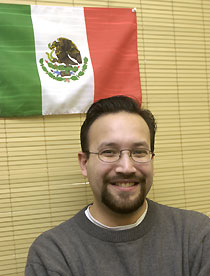|
This is an archived article. For the latest news, go to the Advance Homepage
For more archives, go to the Advance Archive/Search Page. |
||
|
Political Scientist Specializes
Growing up in El Paso, Texas, Adrian Pantoja lived the realities of border politics and immigration policies that are now a part of his class work at UConn. The Rio Grande was a place to fish, or cross on a regular basis to visit family and friends in Cuidad Juarez on the Mexican side.
Pantoja, who has a joint appointment in the political science department and the Puerto Rican and Latino Studies Institute, combines his professional and personal interests in research examining a diverse group that has become this country's largest minority. He specializes in the study of Latino political behavior, immigration and trans-border politics, public opinion, and political behavior. In an article in Political Research Quarterly that he co-authored, "Citizens by Choice, Voters by Necessity," Pantoja examined patterns of political mobilization among naturalized Latinos. A 1999 article in The American Review of Politics considered the role of interest groups in turning out the Latino vote in Los Angeles County. And a forthcoming article in Social Science Quarterly considers ethnic representation in legislatures and political alienation among Latinos. Pantoja watches closely the ever-changing status of U.S.-Mexican relations, which suffered a setback after Sept. 11, 2001. "For someone who is passionate about ethnic politics, I was particularly disturbed by the fact that the terrorists used diversity, immigration, and ethnicity as a way of attacking the U.S.," he says. "Right before the attacks, there was a serious discussion about the legalization of undocumented Mexican workers, and strong ties developed between George Bush and Mexican president Vicente Fox.," he says. "After the attacks, I knew all of that was off the table." Pantoja says that following 9-11, Bush, who speaks Spanish and worked closely with the Latino community as governor of Texas, hardened his demeanor, although that is now beginning to change. Bush is again pushing for the legalization of undocumented workers, bucking the conservative wing of his party. Pantoja supports those efforts. "It's unhealthy for a democracy to have 8 to 11 million un-documented people." He says the alternative would be unacceptable. "We could round them up and deport them. That was tried during the 1930's during the Great Depression and again during the 1950's, and all it brought was anger, resentment, and bad feelings, and it didn't solve the problem." Pantoja says discussions about sealing borders, even if technologically possible, are unrealistic. "It's not just about people sneaking across," he says. "Forty percent came as legal immigrants, on travel, work, or student visas, then overstayed." After graduating from the University of San Francisco, Pantoja went to Claremont Graduate University in southern California, with interests in international relations and the U.S. presidency. But as he began working on his dissertation, something clicked. "In California in the mid 1990's, there was a lot of discussion about the growth of the Latino population and immigration," he says. "Because I grew up along the Mexican border, the assumption was that I knew a lot about these issues. But I, being a typical American of Mexican descent, knew very little about it, just what I saw on television. "I wanted to know more and more about Latino politics, and over time, that necessity has become my passion." After earning his doctorate from Claremont in 2001 and teaching for a year at Illinois State University, that fervor drew Pantoja to Storrs in 2002. His wife, Tania, is an adviser to undergraduate students at UConn. In the Southwest and southern California, Mexican-Americans are the dominant Latino influence. The move to the East Coast was a great opportunity to learn about Puerto Ricans, Dominicans and other Caribbean Latinos, he says. "I was really excited about coming out here to interact with populations that I had only known about on an intellectual level, only known through reading books," Pantoja says. In his classes on political behavior and public opinion issues, Pantoja requires students to spend time in the field, for an up-close-and-personal view of Latino populations. "I have respect for statistics, but simply looking at numbers is not enough," he says. "Diversity in the Northeast lends itself to a greater discussion about what it means to be a Latino," Pantoja says. For example: "Are Haitians Latinos? They share the same island as the Dominican Republic. Some would argue no, they don't speak Spanish, and have a different historical influence. And I would argue that if it's just a matter of language or culture, would we say that Brazilians are not Latinos? These are issues that we wouldn't be speaking about in the West." He says stereotypes abound, even within Latino populations. "I've heard people say Mexicans are not as open or maybe as festive as some of the Caribbean Latinos. That was a shock to me." When asked about Mexican-American attitudes toward Puerto Ricans and Dominicans, however, Pantoja says, "The truth is that we don't really have perceptions. It's not a population we have much contact with in the Southwest. It's not in our consciousness." |

